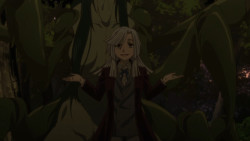 |
 |
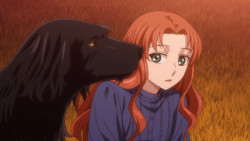 |
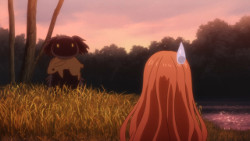 |
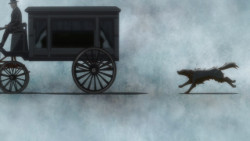 |
 |
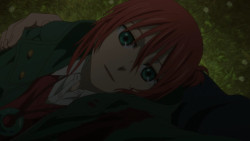 |
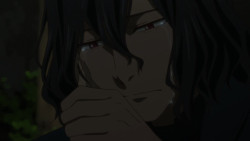 |
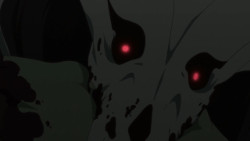 |
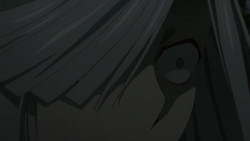 |
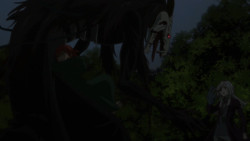 |
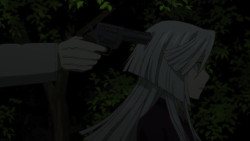 |
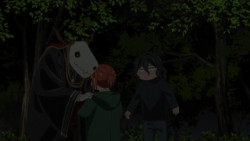 |
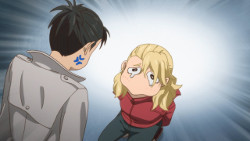 |
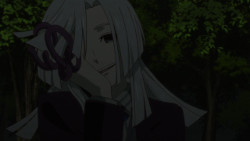 |
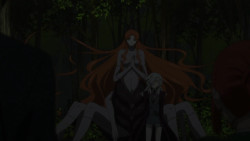 |
 |
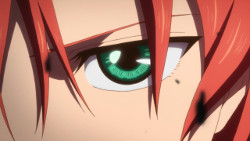 |
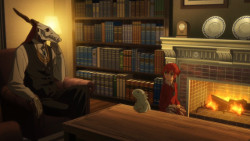 |
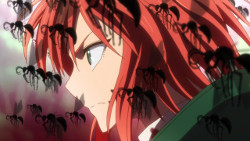 |
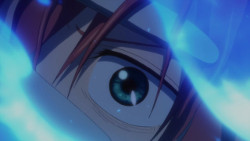 |
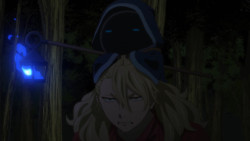 |
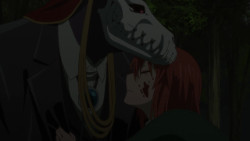 |
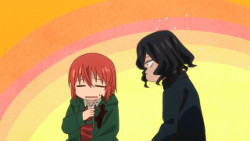 |
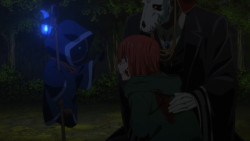 |
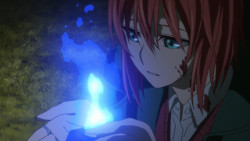 |
 |
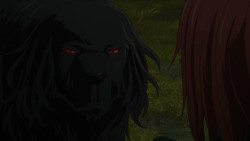 |
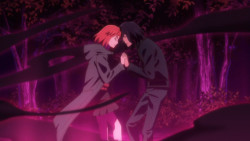 |
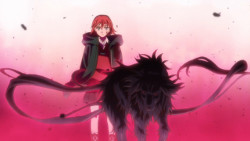 |
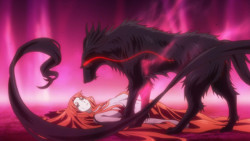 |
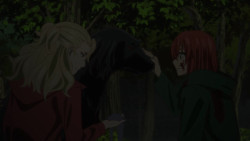 |
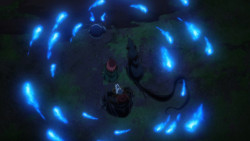 |
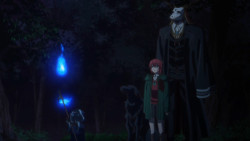 |
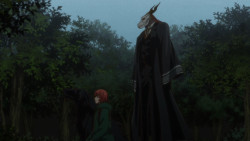 |
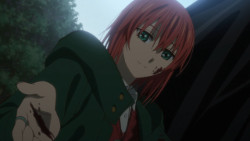 |
「Let Sleeping Dogs Lie」
Looking back over the past several anime seasons, it’s hard to remember another series that’s been so thoroughly on-point as Mahoutsukai no Yome. In most cases, even when we know the source material, there are ups and downs in the process of adaptation – not to mention a sense of uncertainty about how good the final product would be. Honestly, Mahoutsukai has been as close to exactly as expected as realistically possible. It’s religiously faithful to the source, it’s drawn and directed with supreme competence and confidence, and it rarely if ever has a misstep. It’s almost boring how predictably solid this show is, but that praising with faint damnation if ever I’ve written it.
I don’t know if one has to have an interest in the mythology of northern Europe to truly appreciate The Ancient Magus’ Bride, but it certainly can’t hurt. This isn’t virgin territory for manga and anime, but it isn’t too often you see such a pure and well-researched take on it – often we see European fantasy melded with Japanese folklore (itself often a very interesting direction to take). What fascinates me in looking at Western myth through a Japanese perspective is how strongly it blends Christian and pre-Christian ideas in much the same way Shintoism and Buddhism have evolved in Japan. We tend to think of our belief system as a proper and orderly Judeo-Christian model and dismiss everything else as icky paganism, but much more of that ancient tradition survives than most of us are aware of.
That notion is very much alive in the person of Joseph, who emerges as the first true villain in Mahoutsukai no Yome. In fact Joseph’s real name seems to be Cartaphilus – though he despises being called by it. Cartaphilus is a legendary figure in Christian tradition – though truly folkloric in nature, as he’s mentioned nowhere in the bible. He was supposedly a man (depending on the story either a doorman at Pontius Pilate’s estate or a tradesman) who mocked Jesus on his way to the crucifixion, and was cursed to wander the Earth until the day of reckoning (he’s also a common instrument for anti-Semitic hate mongering, but that’s a topic for another day). Given the events of this episode, the connections with Joseph’s character should be obvious.
Joseph is clearly a rogue, even among the roguish fraternity of sorcerers – he thinks nothing of the “tacit agreement” that sorcerers and mages will stay out of each other’s way, and seems to act merely for the purposes of alleviating his own boredom and curiosity. Last week we saw him bring out Elias’ true form for the first time – now it’s Chise whose full force of ire is drawn out by the ageless sorcerer. For his cruelty in the Kingdom of Cats, and for his violation of Isabelle and what it’s done to Ulysse, Chise prepares to unleash her full power to smite him down. Last time it was Chise who brought Elias back from the dark place – this time around he’s the one to return the favor.
The truth of Ulysse’s story is a tragic one indeed – having waxed eloquent on the virtues of cats, Mahoutsukai now reflects on the timeless loyalty of dogs. Ulysse in his mind may have been Isabelle’s brother, but in truth he was never human. He became a church grim by remaining at her grave waiting for Isabelle to wake until he died himself (most dogs traditionally come by the role in far more grisly fashion). But no matter how long he waits for her, Isabelle will never wake – and the horror she’s become in Joseph’s hands is in no way the girl Ulysse loved and died for.
It’s Blue Flame (Ishida Akira) who intervenes and manages to bring things to a relatively peaceful conclusion. He’s a will-o’-the-wisp, perhaps the most famous of all the creatures of faerie. His actions give Ulysse the opportunity to ask Chise to make him her familiar, a pact which once made would be difficult for even Joseph to undo. As part of their bond Chise must choose a new name for Ulysse, and her choice might seem an odd one – we tend to think of “Ruth” as a woman’s name. But it’s also a word which means compassion and empathy (the opposite of “ruthless”), and this is surely why Chise chooses it – to honor the strength of character which bonded Ulysse to his his “sister” in life, and to symbolise that which unites him with his new master in death.
All in all this two-episode arc is typical Mahoutsukai no Yome in every sense. The very soil in which this story plants its roots is loss – and even as it grows, the leaves and flowers it develops reflect the loss they’re grounded in. To live is to suffer, that seems to be the working truth of this series – a dark theme to build around, no question. But to find grace and dignity even when in pain and to celebrate the cycle of rebirth and creation that goes along with loss – there’s something quite beautiful in that, and it’s that which makes this series as emotionally powerful as it often is.
Preview
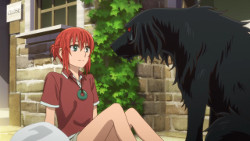 |
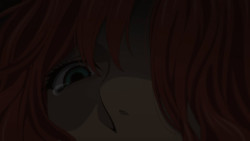 |
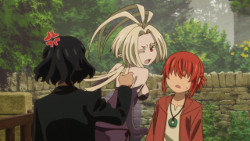 |

I’m not familiar with the source material but I think any concerns others may have about Chise being too weak and passive are pretty well cleared. She was ready to bust up that sorcerer all on her own.
I will say I always find it odd when a lengthly slow sequence takes place while a threatening villain sits and waits nearby. The binding sequence seemed a bit slow and lengthly while Joseph politely just sat back with his monster and watched.
Such a tiny complaint about an overall excellent series.
The only two things I can think about that explains why such long sequences happen without ever getting interrupted by the villain are:
-In the actual situation itself, the procedure (for lack of a better term) doesn’t actually take as long as we see it for.
-It’s some sort of etiquette/protocol thing in the world, which for whatever reason not even the most dastardly/irreverent villain dares to break.
I think it’s probably more the second possibility than the first really, but it’s still definitely weird and probably an issue of pretty much every show that includes magic somewhere.
LOL, it so good that it must be hard for a critic to criticize! My condolences! 😀
IMO, the quality of the writing (and my emotional response to it) has been steadily growing as it progresses. Maybe it’s just my love of dogs, but this touched me very deeply. Ruth and Chise’s bonding oath especially. I agree that the anime has been very faithful to the manga. I did notice that they didn’t mention the Wandering Jew in the Sub that I watched though it is in the TL of the manga. Obviously they didn’t want to offend anyone.
Everywhere Christianity has gone I think it as gone it has been colored by the beliefs of the people’s previous religious beliefs or traditions. Most of what we think of as Christmas or Easter traditions such as holly wreaths, Christmas trees, Easter rabbits and eggs come from them. Consider too the Día de Muertos from Mexico.
Oh, one other comment. I noticed that Ruth looks a lot younger in the OVA.
https://randomc.net/image/Mahoutsukai/Mahoutsukai%20no%20Yome-%20Hoshi%20Matsu%20Hito%20-%20OVA%20-%20Large%2024.jpg
https://randomc.net/image/Mahoutsukai%20no%20Yome/Mahoutsukai%20no%20Yome%20-%2008%20-%20Large%2002.jpg
That’s kind of interesting. Same director and staff, too.
Show Spoiler ▼
It got sort of weird when Ruth and Chise were doing the accepting ceremony thing.. lol But it must’ve been so hard to let go of someone you loved and waited for so long. Ruth is so awesome @v@
I guess you can say Ruth is a good boy.
Though as a human, his face is a bit wan.
Oh no you didn’t.
Cartaphilus scares the hell out of me! I mean, you get your usual antagonist that does horrible with a reason and the ones that just do it becuase it´s so fun to see the world burn, like the Joker. Then you have this monster, Cartaphilus acts like a child that just what he wants to who he wants, no ethics, no moral compass, just going around destroying lives to satisfy his curiosity with a big child-like smile on his face, it´s like complete corruption ofthe concept of the innocence of children.
Being an ageless, non-ethical and bored entity, it’s no wonder that he’s? (maybe “it” would be a better word for Crazy Joe) like that. I’m not convinced, however, that CJ is the Wandering Jew, as the most usual connotation of the curse is that it’s meant for him to really learn about God’s work (the world, it’s people and how to amend himself for all of that for what is believe that was just common stupidity). Here we have just a run-of-the-mill sociopath alchemist.
The counter-argument to that would be (in addition to the name itself) the specific reference to being “cursed by the Son of God”, and the numerous references to agelessness. As far as we’ve been shown, there’s nothing within the usual bailiwick of sorcery that would allow someone to be basically immortal.
At the very least, I think the mangaka wants us to draw that connection. In fact she may have even used the “wandering Jew” moniker itself, though I don’t recall for sure.
The TL of the manga I read did refer to him being the Wandering Jew.
I love this adaptation because it does what a good adaptation should– it hits its marks, it tells the story without making a mess of it, it adds color, sound, movement and fleshes out the flat pages I’ve grown accustomed to.
And by now, we all know how really freaking hard that is to do in anime– making a good adaptation of a LN or a manga is really really hard.
Even though I know what’s going to happen each week, I’m still excited and moved by this show, and that’s a sign of great actors and a great production staff.
The “to live is to suffer” theme of the series has always struck me as very Buddhist, by the way. ISTR something along the lines of, “If you can still feel pain, then you’re alive,” but I can’t remember exactly where anymore.
Indeed, that notion is central to Buddhism (though Buddhism certainly has no monopoly on the idea). That ties into my point about how this series is almost totally built around European mythology (there’s Japanese folklore all over the OVA, not so much the series itself), as seen through a Japanese perspective. And that’s both rather rare and very interesting.
I hope that with the Preview of the next Episode, we do not get now flooded with “Fan Service”.. Until now we did not needed it
okok.. Introducing of Queen Titania.. Yes you got me.. But she is an Queen.. and i bet this one here is an “spirit”.. perhaps some sort of nobility